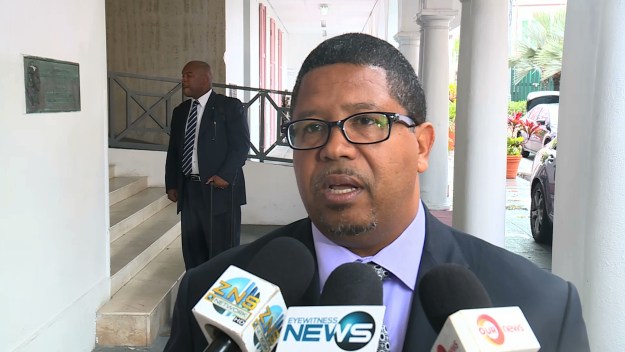DPM: Moodys ‘Stable’ outlook reflects nation in strong position
NASSAU, BAHAMAS – A move by credit ratings agency Moody’s to shift The Bahamas’ credit outlook to ‘stable’ from ‘negative’ yesterday was hailed as a “milestone” by Deputy Prime Minister and Minister of Finance Peter Turnquest.
In an update released Thursday, the international agency also affirmed the Baa3 ratings based on what is noted as “important progress” by the government in the past few years in addressing deficiencies in fiscal policy framework.
“The change in outlook to stable reflects Moody’s view that The Bahamas has made important progress in strengthening its fiscal policy framework and transparency through the introduction of fiscal rules and more frequent and in-depth reporting of the fiscal accounts,” the report read.
“Additionally, Moody’s considers that continued fiscal consolidation will support the stabilization of government debt metrics.”
The ratings agency said a meeting was held last week by a rating committee specifically to discuss the rating of The Bahamas.
Some of the main points raised during the discussion were on the increase of the country’s economic fundamentals, including its economic strength as well as a strengthening of the nation’s institutional strength/framework.
The discussions also focused on The Bahamas’ fiscal strength, including its debt profile, which has not materially changed nor was there a change in the nation’s susceptibility to event risks.
Still, Moody’s specifically pointed to the government’s passing of the Fiscal Responsibility Act (FRA) last year, which established a set of fiscal rules that include a medium-term deficit target, a government debt limit and increased reporting requirements, widely seen as a way for the country to recapture lost policy credibility.
The new Disaster Relief Fund, which places the government in a better position to respond to natural disasters, was also noted as instrumental in the change in outlook.
“While The Bahamas’ credit profile is constrained by its growth potential, high wealth levels enhance the economy’s shock absorption capabilities and measures recently adopted by the authorities will improve The Bahamas’ ability to respond to climate-related shocks, a key underlying credit vulnerability,” Moody’s said.
Yesterday’s changes were seen as “encouraging” by the government, said Turnquest, noting that more progress was needed to improve the nation’s ratings further.
“The recent results are encouraging as they underscore that the strategies employed by this government to stabilize the fiscal situation and strengthen the economic fundamentals are bearing out,” he said.
“After four consecutive downgrades and a persistent ‘negative’ outlook by the rating agency, we are clearly in a much stronger position now. It will continue to take some time for us to get to where we optimally should be, but as a country, we are headed in the right direction.
“As we note the milestone, we must continue to build on this progress and walk the steady road back to achieving a higher investment rating classification – which will take some time. Our ultimate success will be determined by our ability to continue boosting economic growth and maintaining fiscal discipline.”
Turnquest added that the evaluation represents an “independent and impartial assessment of the country’s progress on what had been a dire and untenable fiscal situation”.
Moody’s cautioned that the country’s rating would be downgraded if government fiscal consolidation efforts materially missed the targets set by the country’s fiscal rules or if The Bahamas were affected by a climate-related shock and the policy response did not present a credible return to the fiscal rule’s medium-term targets.
The rating could also be downgraded if the government failed to continue strengthening the fiscal policy framework or contingent liabilities stemming from Bank of The Bahamas – or other state-owned enterprises – materialize on the sovereign’s balance sheet, leading to a material worsening of government debt metrics.
The Bahamas’ long-term foreign-currency bond ceiling is unchanged at Baa1.
Its long-term foreign-currency bank deposit ceiling is unchanged at Baa3.
The short-term foreign-currency bond and bank deposit ceilings remain unchanged at P-2 and P-3, respectively.
The long-term local currency country risk ceilings are unchanged at A2.






